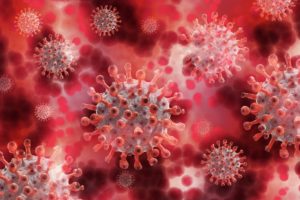
Due to COVID-19, Americans are calling helplines, complaining of being anxious and depressed, struggling to sleep. They have been gambling, drinking, and taking drugs more often.
We have even changed our eating habits as well, with a new focus on what previously was called unhealthy eating. Comfort food eating, high sugar, and high-fat food consumption have meant coronavirus -related weight gain. Isolation, while necessary to protect public health, can change interest in exercising, physical activity, and healthy eating [1].
A survey was conducted online, from April 24 to May 18, 2020, during the pandemic’s social isolation. A total of 602 were interviewed were included in the data analysis [2]. A high percentage of respondents experienced a depressed mood, anxious feelings, hypochondria, and insomnia (61.3%, 70.4%, 46.2%, and 52.2%).
Almost half of the respondents felt uneasy due to the fact of their changed eating habits. They consumed food that they didn’t consume before the pandemic. They consumed comfort food and were inclined to increase food intake to feel better.
Causation is unclear. Many possibilities exist, including suffering the loss of loved one's, working, or living close to people with coronavirus infections and fears related to widespread asymptomatic transmission. Loss of jobs, careers, and livelihoods have accompanied the pandemic.
The mask-wearing, lockdowns, and school closures did not seem to help either. Cornonavirus's second-hand impacts are most significant on the young, urban minorities and people with pre-existing medical, psychiatric, or addiction comorbidities. While the oldest adults, those in nursing and long term facilities, die at the highest rates and are most vulnerable to the virus, but the young and urban are the most susceptible to the aftershocks.
New CDC Study Released on Psychiatric Consequences of the COVID-19 Pandemic
This week, the CDC released a new survey that included responses from 5,412 American adults between June 24-30, 2020. This new survey was looking at mental health, depression, drinking, and drug use during the COVID-19 crisis. More than 40% of the CDC respondents reported a major adverse mental or behavioral health condition. This is remarkable in many ways, but just how many people are currently depressed.
 Suicidal thoughts and calls to hotlines have increased. The CDC report that 11% considered suicide in the 30 days prior. Suicidal ideation was significantly elevated. Approximately twice as many Americans reported thinking about suicide in the previous 30 days compared to 2018- 10.7% versus 4.3%. Depression, sleep disorders, loss of employment, and financial stressors are well-recognized risk factors for suicide.
Suicidal thoughts and calls to hotlines have increased. The CDC report that 11% considered suicide in the 30 days prior. Suicidal ideation was significantly elevated. Approximately twice as many Americans reported thinking about suicide in the previous 30 days compared to 2018- 10.7% versus 4.3%. Depression, sleep disorders, loss of employment, and financial stressors are well-recognized risk factors for suicide.
Among young people, more than 25% of those between 18 and 24 years old are considering suicide. 40.9% reported at least one adverse mental or behavioral health condition during the pandemic. Both anxiety disorder or depressive disorder (30.9%) were most commonly reported.
Also reported by the CDC was PTSD and stressor-related diseases related to the pandemic (26.3%). Many people are using drugs and alcohol, more than they ever did. Additionally, about 13 percent of Americans said they were drinking or using drugs more because of the stress of the epidemic.
One in four Americans reported symptoms of an anxiety disorder to the CDC in June, three times higher than last year. Symptoms of anxiety disorder were increased by three times since 2019 (25.5% versus 8.1%), and the prevalence of depressive disorder was almost four times that reported in the second quarter of 2019 (24.3% versus 6.5%).
The CDC’s report of relapses and new mental and behavioral health conditions associated with the COVID-19 pandemic demonstrates that the pandemic is having a broad impact. Elevated levels of severe mental health conditions, substance use, and suicidal ideation were reported by adults in the United States in June 2020. But, the CDC also reported earlier that overdose deaths were increasing.
Opioids play a role in U.S. "deaths of despair or the rising fatalities from drugs, suicides, and alcohol among Americans without employment, the hope of job opportunities or college degrees." The CDC [3] said earlier this month that opioid overdose deaths would increase to a new U.S. record.
The CDC projected 70,980 overdose deaths in the USA for 2019. Synthetic opioids like fentanyl accounted for around 3,000 deaths in 2013—by 2019, they accounted for over 37,137. Additionally, 16,539 deaths involved stimulants such as methamphetamine, and 16,196 deaths involved cocaine in the most recent CDC reporting.
Patients with pre-existing psychiatric disorders have relapsed and are now reporting a worsening of their psychiatric symptoms [4]. This study confirms the severity of the negative psychological impact on psychiatric patients during the COVID-19 epidemic with strict lockdown measures [5].
One size does not fit all, but evidence-based treatment for psychiatric and substance disorders exist. While in-person treatment may be challenging for all people at this time, expanded use of telehealth is warranted.
Telepsychiatry is a safe and effective way to offer treatment for mental health conditions, including depression, substance use disorder, and suicidal ideation might reduce COVID-19-related mental health consequences. SAMSHA’s Dr. Elinore McCance-Katz has warned [6] of the emergence of increased mental health and substance use issues since the start of the pandemic.
Addiction Policy Forum 2020 Survey of SUD and Coronavirus
The Addiction Policy Forum recently conducted a study to better understand the impact of COVID-19 on individuals with substance use disorders (SUDs between April 27 and May 8, 2020 [7]. The web-based survey was completed by 1,079 SUD patients and impacted individuals whose responses were included in the analyses for this report.
 An additional 533 individuals partially completed the study. The top emotions reported during the pandemic are worry (62%), sadness (51%), fear (51%), and loneliness (42%). Twenty percent of SUD respondents reported increased substance use since the COVID-19 pandemic began.
An additional 533 individuals partially completed the study. The top emotions reported during the pandemic are worry (62%), sadness (51%), fear (51%), and loneliness (42%). Twenty percent of SUD respondents reported increased substance use since the COVID-19 pandemic began.
One in three report changes in access to treatment or recovery support services due to the COVID-19 epidemic. Many of those with SUDs report being unable to access needed services during the pandemic. Access to healthcare systems and support groups is greatly diminished.
Current research on COVID-19 has not addressed other unique challenges facing individuals with SUDs, including the heightened vulnerability and susceptibility to the disease [8]. SUD patients did not report a decreased access to opioid overdose-reversing naloxone or Narcan.
Naloxone - Narcan
Naloxone reverses an opioid overdose, but it should be thought about like cardioversion or CPR rather than a treatment for an underlying disease. Prescribe Narcan, give it to OUD patients and their families, pain patients with MMEs of >50, and those with comorbidities with their pain syndromes such as treatment with Benzodiazepines, sleeping medications, alcohol use disorders, binge drinking, sleep apnea, heart, and respiratory diseases [9].
Naloxone saves lives and is a wonder drug, but it does not replace an intervention, treatment with a MAT, a counselor, a good treatment program, and a treatment plan. Increasing physician competencies in addiction medicine and reducing opioid overdoses by OUD patients, non-medical opioid users, and pain patients. People with addiction continue to be stigmatized and blamed for their disease, rather than helped to find treatment [10].
COVID-19 and patients with pre-existing Psychiatric Disease
The COVID-19 pandemic has already affected mental health, and some of these effects might persist. Suicide risk [11] might be increased in those with psychiatric disorders. Stigma toward patients with SUDs, psychiatric diseases, and COVID-19 and their families might have an increased risk of psychiatric problems.
Missing treatment or medications can cause worsening symptoms. Some Americans might develop new mental health problems, especially depression, anxiety, and post-traumatic stress (all associated with increased suicide risk).
The psychological toll of the disease is already apparent both in the general population and specifically in people with mental disorders (particularly those with severe mental illness and cognitive impairment) and frontline workers. Experts are encouraging us to improve our psychiatric treatment programs and access. They are hopeful that the COVID-19 pandemic can improve mental health care for everyone [12].
Four hundred two adults surviving COVID-19 (265 male, mean age 58), were questioned one-month [13] after hospital treatment. A significant proportion of patients were self-rated in the psychopathological range: 28% for PTSD, 31% for depression, 42% for anxiety, 20% for O.C. symptoms, and 40% for insomnia. Overall, 56% scored in the pathological range in at least one clinical dimension.
Conclusion
 Mental health consequences of COVID-19 are likely to be present for many years and actually peak later than the actual pandemic. Most people have a unique ability to survive and get through arduous times using a one day at a time mantra.
Mental health consequences of COVID-19 are likely to be present for many years and actually peak later than the actual pandemic. Most people have a unique ability to survive and get through arduous times using a one day at a time mantra.
The pandemic has caused slips and relapses among people who have major psychiatric or addictive diseases. New data suggests that almost half of all Americans are having new psychiatric problems as a result of the pandemic crisis.
Anxiety, depression, PTSD, and insomnia are increasing. We may be seeing suicidal thinking at this time because of known precipitants, like alcohol, depression, and substance use increases. In addition, domestic violence and child abuse might increase during the lockdown and have major short and long term impacts.
Repeated exposure to 24-7 news coverage of death and destruction can, by itself, increase fear and also heighten suicide risk. These are unprecedented times that leave many people vulnerable to a full-range of major mental health problems and suicidal behavior.
Resources:
1. Ammar A, Brach M, Trabelsi K, et al. Effects of COVID-19 Home Confinement on Eating Behaviour and Physical Activity: Results of the ECLB-COVID19 International Online Survey. Nutrients. 2020;12(6):1583. Published 2020 May 28. doi:10.3390/nu12061583
2. Di Renzo L, Gualtieri P, Cinelli G, et al. Psychological Aspects and Eating Habits during COVID-19 Home Confinement: Results of EHLC-COVID-19 Italian Online Survey. Nutrients. 2020;12(7):2152. Published 2020 Jul 19. doi:10.3390/nu12072152
3. https://www.mdedge.com/psychiatry/article/227019/coronavirus-updates/deaths-despair-tied-drug-dependence-are-accelerating
4. Vindegaard, N., & Benros, M. E. (2020). COVID-19 pandemic and mental health consequences: Systematic review of the current evidence. Brain, behavior, and immunity, S0889-1591(20)30954-5. Advance online publication. https://doi.org/10.1016/j.bbi.2020.05.048
5. Hao, F., Tan, W., Jiang, L., Zhang, L., Zhao, X., Zou, Y., Hu, Y., Luo, X., Jiang, X., McIntyre, R. S., Tran, B., Sun, J., Zhang, Z., Ho, R., Ho, C., & Tam, W. (2020). Do psychiatric patients experience more psychiatric symptoms during COVID-19 pandemic and lockdown? A case-control study with service and research implications for immunopsychiatry. Brain, behavior, and immunity, 87, 100–106. https://doi.org/10.1016/j.bbi.2020.04.069
6. https://www.samhsa.gov/newsroom/press-announcements/202008140930
7. https://www.addictionpolicy.org/covid19-report
8. Wei, Y., & Shah, R. (2020). Substance Use Disorder in the COVID-19 Pandemic: A Systematic Review of Vulnerabilities and Complications. Pharmaceuticals (Basel, Switzerland), 13(7), 155. https://doi.org/10.3390/ph13070155
9. https://www.mdedge.com/psychiatry/article/227019/coronavirus-updates/deaths-despair-tied-drug-dependence-are-accelerating
10. https://www.drugabuse.gov/about-nida/noras-blog/2020/04/addressing-stigma-surrounds-addiction
11. Gunnell D, Appleby L, Arensman E, et al. Suicide risk and prevention during the COVID-19 pandemic. Lancet Psychiatry. 2020;7(6):468-471. doi:10.1016/S2215-0366(20)30171-1
12. Moreno C, Wykes T, Galderisi S, et al. How mental health care should change as a consequence of the COVID-19 pandemic [published online ahead of print, 2020 Jul 16]. Lancet Psychiatry. 2020;S2215-0366(20)30307-2. doi:10.1016/S2215-0366(20)30307-2
13. https://www.sciencedirect.com/science/article/pii/S0889159120316068
About the Author:
 Mark S. Gold, M.D., Professor, Washington University School of Medicine - Department of Psychiatry, served as Professor, the Donald Dizney Eminent Scholar, Distinguished Professor and Chair of Psychiatry from 1990-2014.
Mark S. Gold, M.D., Professor, Washington University School of Medicine - Department of Psychiatry, served as Professor, the Donald Dizney Eminent Scholar, Distinguished Professor and Chair of Psychiatry from 1990-2014.
Dr. Gold was the first Faculty from the College of Medicine to be selected as a University-wide Distinguished Alumni Professor and served as the 17th University of Florida’s Distinguished Alumni Professor.
Learn more about Mark S. Gold, MD
The opinions and views of our guest contributors are shared to provide a broad perspective of addictions. These are not necessarily the views of Addiction Hope, but an effort to offer a discussion of various issues by different concerned individuals.
We at Addiction Hope understand that addictions result from multiple physical, emotional, environmental and genetic factors. If you or a loved one are suffering from an addiction, please know that there is hope for you, and seek immediate professional help.
Published on August 19, 2020
Reviewed by Jacquelyn Ekern, MS, LPC on August 19, 2020
Published on AddictionHope.com
